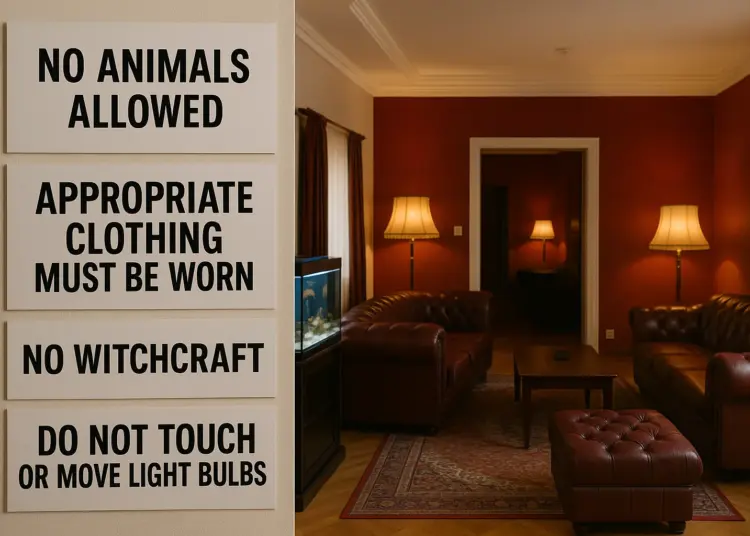Story Highlight
– Brothel rules include no animals or inappropriate clothing.
– One client smuggled in a fish tank.
– Polar bear costume worn by a customer allowed.
– Witchcraft, like sprinkling sugar, is forbidden.
– Light bulbs cannot be touched; incident prompted rule.
Full Story
Catherine De Noir, the manager of a prominent legal brothel in Europe, has recently shared a glimpse into the operational side of the establishment, revealing a set of strict rules that both clients and staff are expected to adhere to. These regulations, which govern the day-to-day functioning of the brothel, showcase an intriguing blend of professionalism and peculiar incidents that have occurred over the years.
In a recent social media post, Catherine provided insights into these regulations, highlighting some unusual breaches of conduct that have occurred. One of the first rules outlined is the prohibition of animals within the brothel premises. Despite this clear directive, Catherine recounted an eyebrow-raising incident where a client managed to sneak in a fish tank, showcasing a bizarre disregard for the house rule. “Yet one woman managed to smuggle in an entire fish tank,” she noted, implying that the creativity of some individuals knows no bounds.
The second rule emphasizes the importance of appropriate attire for clients visiting the brothel. However, this regulation has also experienced its share of challenges. Catherine recalled an unusual case where a customer arrived dressed in a full polar bear costume, raising questions about what constitutes “appropriate” in such a setting. Her experience of nearly a decade in the industry highlights the diverse array of characters who engage with the establishment.
In a further exploration of the house rules, she discussed the prohibition against witchcraft. This regulation was established following some staff members’ intriguing attempts to ward off spirits by sprinkling sugar around the club. Catherine’s candid admission regarding this aspect of the work environment illustrated the diverse experiences that come with managing a legal brothel, often populated by both ordinary customers and notable public figures.
The final rule she discussed revolved around a seemingly mundane aspect: light bulbs must not be touched or moved under any circumstances. This rule came into effect following a rather alarming incident where a worker managed to set a lamp on fire, prompting a swift and necessary restriction to prevent any potential hazards.
Catherine’s revelations have resonated with audiences on social media, particularly on her TikTok account, where her post has garnered over 364,200 views. Many viewers expressed their fascination and curiosity regarding the norms and occurrences within such an unconventional setting. Comments ranged from a request for more stories—“Am I the only one who wants to just listen to all these stories for a night?”—to sheer amazement at the idea of someone attempting to sneak in a fish tank.
Simultaneously, the broader discussion surrounding brothels in the UK remains a contentious topic amid ongoing debates about whether legalising such establishments could result in improved safety and working conditions for sex workers. Currently, the legal framework prohibits the operation of brothels, while individual sex work remains legal. Advocates for reform argue that legalising brothels might help bring the industry into a regulated environment, enhancing the safety and health options available to workers. This perspective stands in contrast to those who worry that such changes could inadvertently increase human trafficking and exploitation, potentially exacerbating the challenges faced by individuals in vulnerable positions.
As the conversation about the legality of brothels continues, it is evident that a multitude of perspectives exists, with each viewpoint underscoring the complexity of the subject. Policymakers are tasked with navigating these competing interests, weighing the benefits of regulation against potential societal impacts and community concerns.
Catherine De Noir’s anecdotes shed light on the realities of managing a legal brothel and challenge preconceived notions about the industry. Her insights may also serve as a reflection of the broader cultural discussions unfolding within the UK regarding sex work and its regulation. As societal attitudes evolve, both the responsibilities of establishments like hers and the rights of those who work within the industry are called into question, creating a dynamic landscape that reflects the multifaceted nature of human interactions.























As someone working in health and safety, clear and enforceable rules are essential for protecting both staff and clients. Bans on animals and on handling light bulbs make sense from an infection control and fire risk perspective. Clothing policies should balance safety and dignity. Prohibiting open flame or risky items after a lamp fire is a sensible response, and any unusual activities that could pose physical or psychological harm need assessment and clear guidance. Whatever the setting, rules should be evidence based, communicated clearly, and reviewed after incidents to reduce risk and ensure compliance with relevant law.
As someone focused on workplace safety, robust rules like those described make sense when the priority is protecting staff and clients. Banning animals, restricting costumes that could obstruct vision or movement, and prohibiting open flames or risky items such as lamps that can overheat are practical steps to reduce hazards. Clear policies about personal conduct and activities that could create legal or safety risks also help manage liability and maintain a secure environment. The challenge is ensuring rules are consistently enforced, clearly communicated, and reviewed after incidents so they remain proportionate and effective.
As a health and safety professional, rules like no animals and no touching light bulbs make sense. Introducing live creatures or improvised lighting increases the risk of slips trips contamination and fire. Clear dress code expectations help maintain hygiene and reduce unexpected hazards. Banning activities that involve open flames sparks or unfamiliar substances is sensible. These policies are about protecting clients staff and premises as much as enforcing standards of conduct.